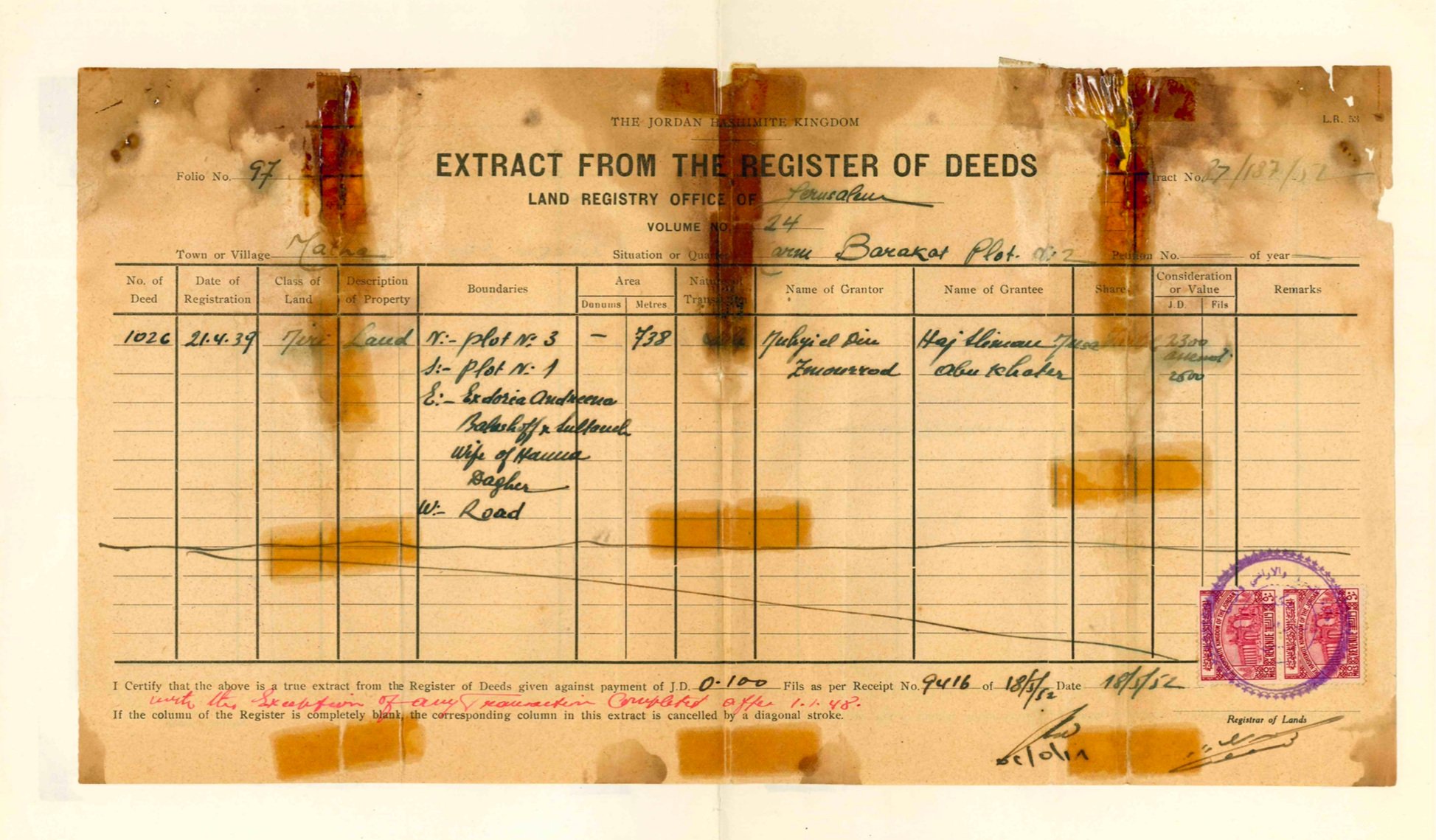I tracked down the house Israel stole from my grandfather
It feels personal when I hear that the US embassy in Jerusalem will be built on land stolen from Palestinians.
originally published 28th August 2022, on Aljazeera.com




Last month, and coinciding with United States President Joe Biden’s visit to Jerusalem, the Haifa-based Adalah Legal Center released a report detailing how land designated for a planned US embassy was actually owned by Palestinians before it was stolen by Israel following the Nakba of 1948.
The descendants of the original owners include Palestinian residents of East Jerusalem, as well as Palestinian Americans. Adalah, along with these descendants, shared in their report original documents serving as proof of ownership of the property in Jerusalem. The parties have demanded that the Biden administration cancels the plan to build a diplomatic mission on stolen land.
The revelations and the struggle of Palestinians to reclaim their land feel personal to me. They echo a similar battle for our past that my grandfather – and many others – waged.
After 1948, Israel legalised the systematic theft of Palestinian homes and properties in West Jerusalem, in particular through the Absentee Property Law. That 1950 legislation declared Nakba refugees “absentees” even if they were in the eastern part of Jerusalem and allowed the Israeli government’s Custodian of Absentee Property to take over their property.
Back then, the Americans themselves recognised this fact in a cable sent by the US consul general in Jerusalem in December 1948. The consul general wrote to the US secretary of state, stating that Israel was trying to “eliminate” the possibility of Palestinian refugees returning home, in defiance of a United Nations resolution passed earlier that month and supported by the US.
My family was one of the many Palestinian families that were denied the right to our homes in Jerusalem’s west side.
Our oasis
Before Israel, my grandfather owned a house in al-Qatamon, a modern and affluent neighbourhood of Jerusalem, located 2km (1.2 miles) south of the Old City. Established in 1860, Al-Qatamon included 204 Palestinian homes on land that spanned 20 hectares (49 acres). It was established to accommodate middle to upper-class Jerusalemite families who found life within the walls of the Old City too crowded.
The population of the neighbourhood was mainly Muslim and Christian, along with a few foreign families who lived there during the time of the British Mandate. Growing up, Palestinian writer and doctor Ghada Karmi brought al-Qatamon alive for me through her 2002 memoir, In Search of Fatima. In her book, Karmi described her family’s stone house and its garden full of citrus and olive trees. Karmi and her family were forced out of the neighbourhood when she was eight years old, during the Nakba.
Later, I came to hold documents that my grandfather and father had carefully kept, proving the ownership of our house in al-Qatamon. The papers showed that my grandfather had registered the property on April 21, 1939. He had bought it from another Palestinian Jerusalemite family, the Zmourrods.
Everything changed in 1948, following my family’s expulsion to East Jerusalem. My grandfather, though just 1km (0.6 miles) away from al-Qatamon, was suddenly an “absentee” under Israeli law.
The land registry deeds in my hands showed how on July 28, 1957, the Custodian for Absentee Property sold my family’s house to Israel’s Development Authority, so it could be taken over by new Jewish tenants. The same land registry deeds that listed my grandfather as the owner of this property now had another party selling it away.
Legal discrimination
In 1970, the Israeli Knesset passed the Legal and Administrative Matters Law, which effectively meant that Jewish owners who had to flee their property in East Jerusalem in 1948 would not be considered “absentees” in the then-newly occupied part of the city. They could return to claim their homes. That same law, however, did not extend similar benefits to East Jerusalem residents who once owned property in West Jerusalem. Those Palestinians, like my grandfather, remained “absentees”.
Still, my grandfather decided he wanted to claim his home. On March 28, 1972, as a resident of a Jerusalem “unified” under Israeli authority, he wrote a letter to the Custodian of Absentee Property. He requested that his house be returned to him since he was now a resident of Jerusalem and no longer “absent”. He finished his letter with these emphatic words: “This house is my private property and no one else has any connection with it.”
Nearly a month later, the Custodian of Absentee Property in Jerusalem wrote back, citing the Absentee Property Law as cause to turn down my grandfather’s plea.
With the documents in my hand, and relying on what my father knew, I pinpointed the exact location of the house and took my dad for a visit in the summer of 2021. We were not surprised to find it was still there, and that it was occupied by a Jewish Israeli family. The building had two extra stories added on top of the original one-storey house. Everywhere I looked in the neighbourhood, I saw evidence of our Palestinian existence, and I felt the heartache of our erasure.
The 1970 law enabled Jewish groups to claim ownership of property in East Jerusalem, most prominently in the areas of Sheikh Jarrah and Silwan. To date, Palestinians displaced by Israel do not enjoy that right in West Jerusalem.
As Palestinians in Sheikh Jarrah, Silwan, and other neighbourhoods of East Jerusalem face eviction orders in favour of Jewish settlement, I cannot stop thinking about the sheer injustice of it all.
They claim Jerusalem is an undivided city, yet there are two laws governing two peoples in the most unequal manner. They claim we have rights, yet I believe they merely tolerate our existence. We lack the right to vote, the right to housing, the right to property – and with our ancestral homes stolen, the right to our history.